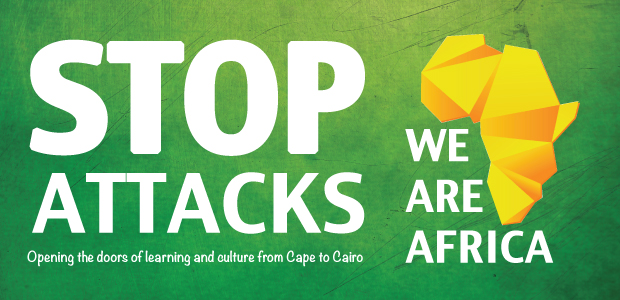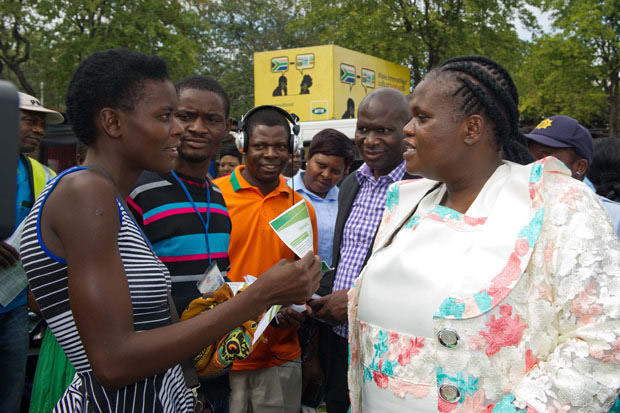President Jacob Zuma has appointed an Inter-Ministerial Committee (IMC) on Migration to strengthen and broaden the scope of the work started by Ministers Mahlobo, Gigaba and Nhleko. In the coming weeks and months the IMC, lead by Minister Jeff Radebe, will work with all the affected parties so as to seek a lasting solution to the issues raised by communities and foreign nationals. Minister Radebe updated the media on 28 April.
An outreach programme took place during the week of 20 April where President Jacob Zuma is leading Ministers and Deputy Ministers in engaging with stakeholders and communities to discuss the country's migration policy and promote peaceful co-existence with people of all nationalities. Marches are organised in cities to show people's opposition to attacks on foreign nationals. This process is ongoing.
The South African Government has condemned in the strongest possible terms the recent outbreak of violent attacks in parts of the country against foreign nationals, particularly fellow Africans from various African countries.
The South African Government views the attacks on foreign nationals as a criminal offence that will not be tolerated. South Africa is a constitutional democracy governed by laws. Everyone working and living in the country must obey its laws in their totality. No one has the right to take the law into their own hands. The South African Government will enforce the laws of the country and will not hesitate to act against criminal activity or those found to incite violence.
South Africa’s transition to democracy was one of the world’s most iconic testimonies of tolerance and peaceful co-existence. Under the stewardship of Nelson Mandela the country had an unwavering dedication to democracy, selflessness, reconciliation, service to humanity and a better life for all.
The recent attacks on foreign nationals are a threat to our historical achievements as a nation. Moreover, the attacks go against the democratic values enshrined in the Constitution.
Attacks against foreign nationals since the start of the year were reported in Soweto, Benoni, Atteridgeville, Khayelitsha, Inanda and KwaDukuza. The situation has been recently worsened following the death of three foreign nationals on 9 April 2015 in Chatsworth and Umlazi in Durban.

The South African Government has thus far (20 April 2015) responded as follows to this matter:
- President Jacob Zuma has cancelled his visit to Indonesia, and instead visited displaced foreign nationals in Chatsworth to assure them of our support as government of South Africa. The President also engaged with the Umlazi community to spread the message of peace and tolerance. He will, in the week of 20 April, lead a stakeholder outreach programme around the country to engage communities to start a conversation within our society.
- President Zuma addressed parliament on the issue on 16 April. The statement he made is now available in all official languages, Portuguese, French, Urdu and Arabic in order to reach as wide an audience as possible.
- President Zuma has assigned the Ministers of Home Affairs (Mr Malusi Gigaba), Police (Mr Nathi Nhleko) and State Security (Mr David Mahlobo) to stop the violence that has broken out in parts of the country particularly in the KwaZulu-Natal (KZN) in some Durban residential areas. This includes the establishment of an Inter-Departmental Task Team to coordinate the response. They briefed the media on progress on 19 April.
- Ministers Malusi Gigaba and Maite Nkoana-Mshabane met with members of the African diplomatic community and other representative to assure them of Government's commitment to peace.
- A Panel of Experts has been set up under the leadership of the former United Nations High Commissioner for Human Rights, Judge Navi Pillay. Its purpose is to advise the Government on the integration of foreigners into the local communities on an ongoing basis.
- Additional law enforcement officers have been mobilised from around the country and deployed to the affected areas to enforce the law and prevent further attacks.
- By the morning of 19 April 307 suspects have been arrested in connection with attacks on foreigners and public violence across the country.
- All district disaster management centres have been placed on high-alert. A 24-hour call centre has been established and remains accessible in the event that further attacks of this nature occur in the future.
- Shelters have been set up to accommodate displaced foreign nationals and basic amenities such as water, sanitation, and healthcare are being provided.
- The South African government is working closely with the United Nations High Commissioner for Refugees (UNHCR), United Nations Children’s Fund (UNICEF), International Organisation for Migration (IOM), as well as non-governmental organisations to provide food, psycho-social and other support to those affected. Assistance is available at Social Development trauma counselling toll free number: 0800 428 42.
- The process of reintegrating those who were displaced back into their communities has begun.
- The Ministry of Small Business Development will fast-track the implementation of the National Informal Business Upliftment Strategy (NIBUS) as part of addressing the concerns and challenges that face the informal business sector. NIBUS is based on three key pillars, namely skills development among the South African population, exploring partnerships between locals and foreign traders and reviewing policies and regulations.
- Community engagements are being conducted through the Communities in Dialogue programme, community safety forums, ward committees, and through community development workers, amongst others.
Join us on Twitter: #WeAreAfrica
Watch our video messages on the attacks against foreign nationals
Civil society messages
Other documents
Stop attacks leaflet - English [PDF]
Pictorials and photo galleries
- Minister Faith Muthambi at Musina, Limpopo to fight against attacks on foreign nationals, 26 April 2015
- Deputy Minister Stella Ndabeni-Abrahams in Buffalo City Metro to fight against attacks on foreign nationals, 26 April 2015
- Free State Premier leads outreach in QwaQwa against attacks on foreign nationals, 24-25 April 2015
- Beit Bridge border post outreach against attacks on foreign nationals, 24 April 2015
- We Are Africa: Campaign against attacks on foreign nationals, 24 April 2015
- Alexandra SAPS Imbizo, 24 April 2015
- Ehlanzeni district outreach against attacks on foreign nationals, 24 April 2015
- Port Elizabeth outreach against attacks on foreign nationals, 23 April 2015
- Ekhurhuleni outreach attacks on foreign nationals, 22 April 2015
- East London outreach against attacks on foreign nationals, 21 April 2015
- King Goodwill Zwelithini's Imbizo against attacks on foreign nationals, 21 April 2015
- Minister for Rural Development and Land Reform Mr Gugile Nkwinti joins outreach in QwaQwa against attacks on foreign nationals, 15 April 2015
- Photo galleries






